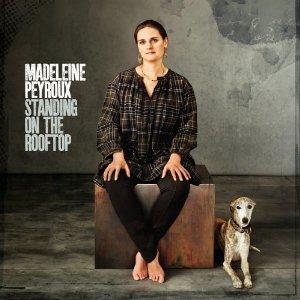When you talk to the singer Madeleine Peyroux on the phone, her voice is low, soft, as if she were standing behind a curtain.
That seems like an apt thought—most of the things you learn about Peyroux (pronounced Peru) tend to always return home to words and music, music and words, the songs she sings, the influences, the words she writes.
Peyroux, who performed at the Music Center at Strathmore in September and has a new, highly-original album, “Standing on the Rooftop,” is hard to pigeon hole or categorize. When you tell her that, she seems pleased.
“I don’t think I’m ever any one thing, one sound, one kind of music. You evolve, you grow, you change, and you challenge yourself. At least I hope that’s what I do,” she said. Now in her thirties, the Georgia native made an early splash with her album, “Dreamland,” which was countered a few years later with “Careless Love,” a work full of contrary influences, adventuresome singing and songs you couldn’t get out of your head for the longest of times, including the title tune.
Most of the songs on that album were by others, including Leonard Cohen, Bob Dylan, Gene Austin, Hank Williams, George Cory and William C. Handy. The album also carries a quote from poet Dylan Thomas,”but for the lovers, their arms around the griefs of the ages” and is dedicated to “poets, writers of these songs, memorable people of memorable times such as these, wherever you are.”
She’s variously described as a jazz singer, a hippie, a contemporary folk singer, a modern Billie Holliday. Inevitably, writers are left with the idea that she might not be any of these things or she’s all of these things.
“Style is not so easy to define,” she says. “When I was younger my mother and I moved to Paris, and it was very hard to adapt musically.” Peyroux started a group of her own, and often resorted to doing what’s called the “busker” scene, singers and musicians whom you can find on street corners all over Paris. Even the photographs of her in the “Careless Love” album have some of that restless, carnival quality to them, a mime’s striped slacks, derby hat, suspenders or vests, or in another, a big flowing gown, all of them have a troubadour quality to them.
Bob Dylan is a big influence with her—“You can’t help but be attracted to his work, his words, especially his song writing,” she said. “He is foremost a poet and that never changes.”
Listen to her singing, you can hear the blues, the after-hours voice, the sad epiphanies of loss and wandering, but it changes too. You know in there is a trumpet that hasn’t been exercised yet, a shout or two.
“That’s nice,” she says, then rattles off Cohen, the two Dylans (Bob and Thomas), Odetta and Bessie Smith and a host of others, including Charlie Chaplin as influences.
Her first bout of fame was with her street band, the Riverboat Shufflers, after which she joined (at age 16) a group called “The Lost Wandering Blues and Jazz Band,” and eventually she got an album in 1996 with Atlantic, no less, singing covers of Patsy Cline, Bessie Smith and Edith Piaf songs.
And then, (and now) she did something completely different: “Bare Bones” and the current “Standing on the Rooftop,” in which a goodly number of the songs have either been written solely by herself or in collaboration with others. “It was a leap but it was something I think I’ve been working towards, something I’ve wanted to do for a long time.”
“The Kind You Can’t Afford” was co-written with Rolling Stoner Bill Wyman, “The Things I’ve Seen Today” and “Fickle Love” were written with Jenny Scheinman. Best of all is the fun, feisty “Don’t Pick a Fight with a Poet,” a lighter touch here, and perhaps most haunting is “Martha My Dear,” an old Beatles tune.
Peyroux is both a new self—daring in “Lay Your Sleeping Head My Love,” a sometimes quirky piece with difficult and original music by Marc Ribot based on a poem by W.H. Auden—with her own writing, and still in touch with her base—a Dylan (Bob) song called “I Threw It All Away.”
But she’s still just about impossible to classify.
She likes that.
But we’ll give it a shot.
She’s as close to a true poet as we have today in the music world. Her voice is a poet’s voice. And all the songs—hers and others—end up being poems that your memory will quote later as if by heart.


